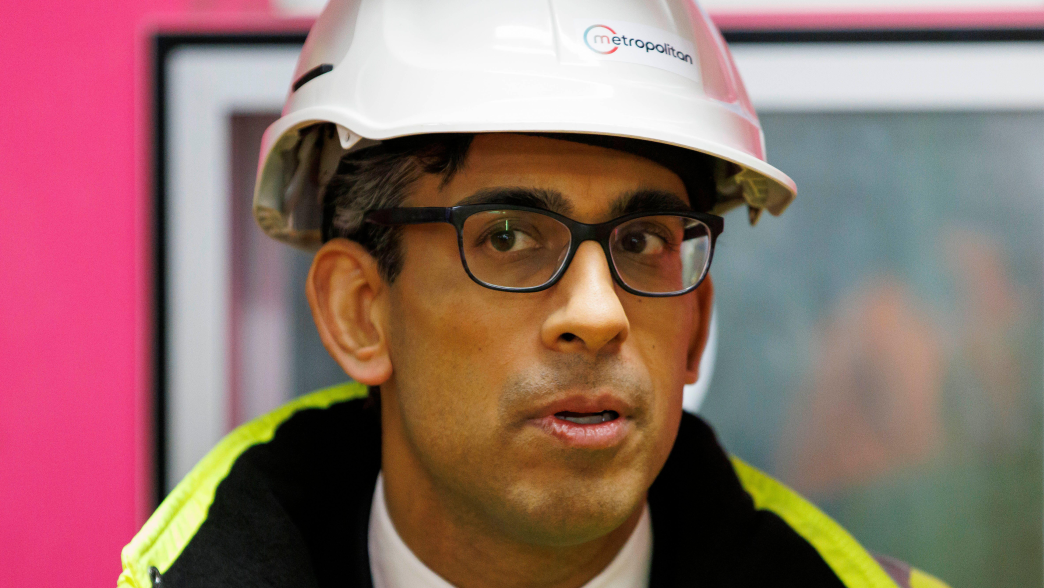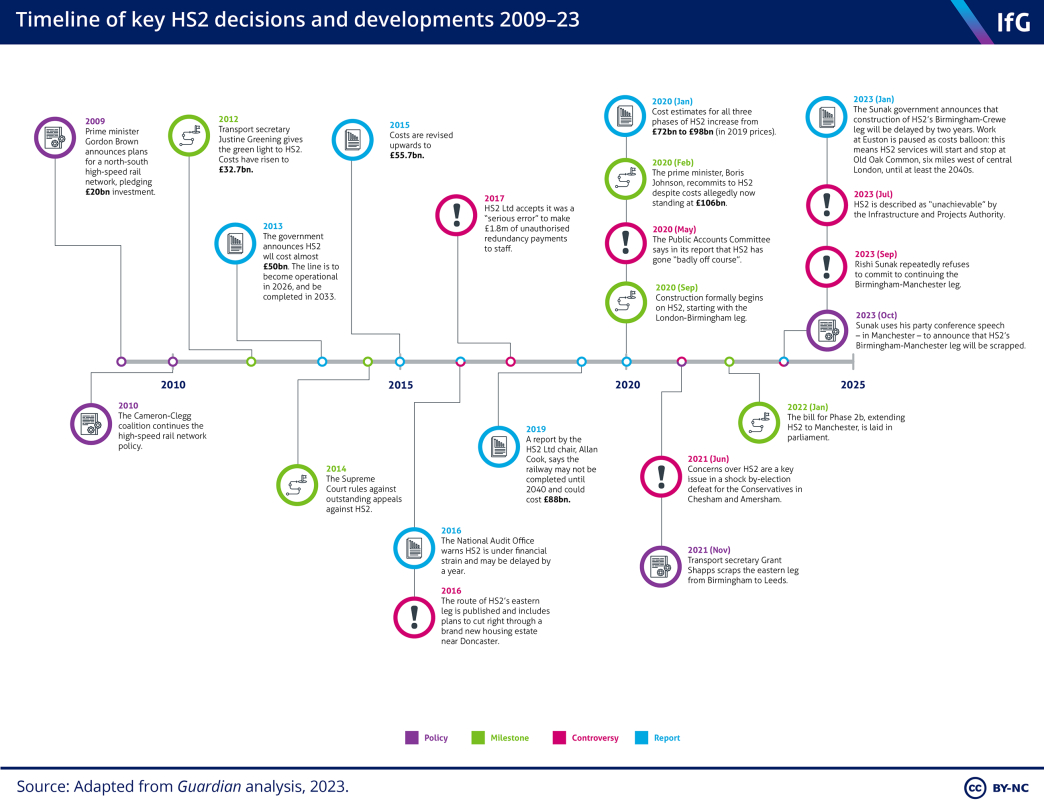HS2 is a fiasco of change and churn
Rishi Sunak's HS2 cancellation does not look like long-term decision making.

Rishi Sunak needs to set out exactly how he will redirect the £36bn previously earmarked for HS2, otherwise he will continue to undermine belief in the UK government’s ability to plan long-term and deliver much-needed infrastructure, write Emma Norris and Gemma Tetlow
In his speech to Conservative party conference in Manchester, the prime minister announced the cancellation of the high-speed Birmingham to Manchester leg of HS2. This decision comes after years of problems for the project, with the eastern leg of the line between Birmingham and Leeds scrapped in 2021, work on the Birmingham to Crewe leg delayed this March, and work on the Euston terminus paused as costs spiralled. The project has been almost constantly beset by delays, cost overruns, downgrades, and cancellations.
Rishi Sunak also set out how the £36bn saved from cancelling the project would be redirected, but if this shift in transport infrastructure spending is to contribute to improved economic outcomes for the Midlands, the North and the wider UK, then the prime minister must learn from HS2's failings. This means setting out clear objectives, publishing regularly reviewed estimates of the costs and benefits, and putting forward a realistic plan for delivery. Investors need this clarity. Voters need convincing.
HS2’s history is a depressing account of what is wrong with infrastructure policy making
HS2 is not an anomaly in suffering uncertainty and delay, with the project echoing problems that have also plagued many previous major infrastructure projects in the UK: wildly optimistic initial cost estimates, politicians favouring “splashy announcements” of mega-projects over smaller scale alternatives, too quickly ruling out alternative options and finding it hard to change course even when costs increase or expected benefits fall.
Rishi Sunak is right that the costs of HS2 have inflated beyond all early estimates. A budget of £55.7bn for the whole of HS2 was set in 2015 but has since surpassed £100bn, partly driven up by inflation increases but also by expanding the scope of the project and costing in rolling stock that was omitted from the early estimates. Major project cost control is a serious and persistent weakness in UK infrastructure delivery – as is accurate forecasting of costs before projects begin. Crossrail and Thames Tideway similarly overran initial estimates by a considerable amount.

Policy instability increases costs and reduces benefits
But whilst the prime minister is right that HS2 has proved much more expensive than planned, the casting of his decision as part of a reset focused on making long-term decisions is hard to take.
The HS2 cancellation is likely to have been at least partly driven by a desire to create short term financial headroom ahead of the general election to fund tax cuts – the very definition of short-termism. The decision creates more problems for the long term too – the constant changes to the HS2 plan and the policy instability they create damages industry confidence in government promises and wider confidence in the UK’s ability to see major infrastructure projects through. It was only last autumn that the chancellor unequivocally committed to the northern leg of HS2. Industry figures have described the ‘shock waves’ and poor message this reversal sends both investors and local communities.
The story of HS2 is emblematic of wider problems with policy making in this country. Secretaries of state and junior ministers come and go at an alarming rate – there have been ten ministers of state with some responsibility for rail since 2010. Rather than focusing on seeing things through and being rewarded for delivery, in their short tenures ministers are incentivised to make new announcements and changes with little attention paid to the long-term consequences. The country will be hard pressed to tackle the challenges this country faces – from tackling regional inequality to climate change – if there is a failure to chart long-term, stable paths which government, citizens and industry can unite around.
Sunak's new transport plans require full transparency
Rishi Sunak’s claim that he has made a difficult choice to cancel a high-profile project in favour of better value, smaller projects could superficially have merit. UK politicians have a long history of committing too early to big, shiny projects and finding it impossible to change course even when the facts change. Three years ago, the National Infrastructure Commission concluded that “prioritising regional links, for example from Manchester to Liverpool and Leeds or Birmingham to Nottingham and Derby, has the potential to deliver the highest benefits for cities in the Midlands and the North”, rather than prioritising HS2 – but Boris Johnson chose still to press ahead with HS2.
But the details of Sunak’s announcement do not stand up to scrutiny. Eagle-eyed observers have already pointed out that some of the smaller infrastructure projects he suggested could now be funded have already been completed – including the Nottingham tram system extension to Clifton South which opened eight years ago – while others, like the A1 upgrade, have already been promised (but not delivered) by every Conservative-led government since 2010. The Transpennine Route Upgrade between Manchester and York – first announced in 2011 – is still nowhere close to completion. Northern voters could be forgiven some scepticism about the promise that the £36bn estimated savings from this cancellation will be channelled into other northern rail projects.
To facilitate proper parliamentary scrutiny and to reassure the public and the private sector that the government now has a coherent and long-lasting plan for investment in transport infrastructure, it is imperative that the prime minister makes public full information on the costs and benefits of the proposed projects and the reason for his prioritisation of the schemes. This includes producing a proper, revised business case for what remains of HS2, in particular the parts that have yet to be built.
To aid this, the government needs to be fully transparent about the objectives it is aiming to achieve. One of the problems in assessing whether HS2 was likely to deliver value for money was that the stated objectives changed over time. Politicians initially emphasised cuts to journey times but later suggested the value lay in increasing capacity on the West Coast mainline. If Sunak is to ensure that the £36bn now pledged to transport projects in the Midlands and North is well spent, then he must be clear about what the objectives are for this spending and why the list of projects he has now announced have been chosen. This also means publishing regularly reviewed estimates of the costs and benefits and putting forward a realistic plans for delivery.
The prime minister claims that he will ‘reinvest every single penny, £36 billion, in hundreds of new transport projects in the North and the Midlands, and across the country... that will make a real difference’. For now, however, Sunak’s latest announcements will do little more than further undermine belief in the UK government’s ability to plan long-term and deliver much-needed infrastructure.
- Topic
- Public finances
- Keywords
- Integrated Rail Plan Transport Infrastructure
- Political party
- Conservative
- Position
- Prime minister
- Administration
- Sunak government Johnson government Cameron government
- Department
- Department for Transport HM Treasury
- Public figures
- Rishi Sunak David Cameron Boris Johnson Mark Harper
- Publisher
- Institute for Government